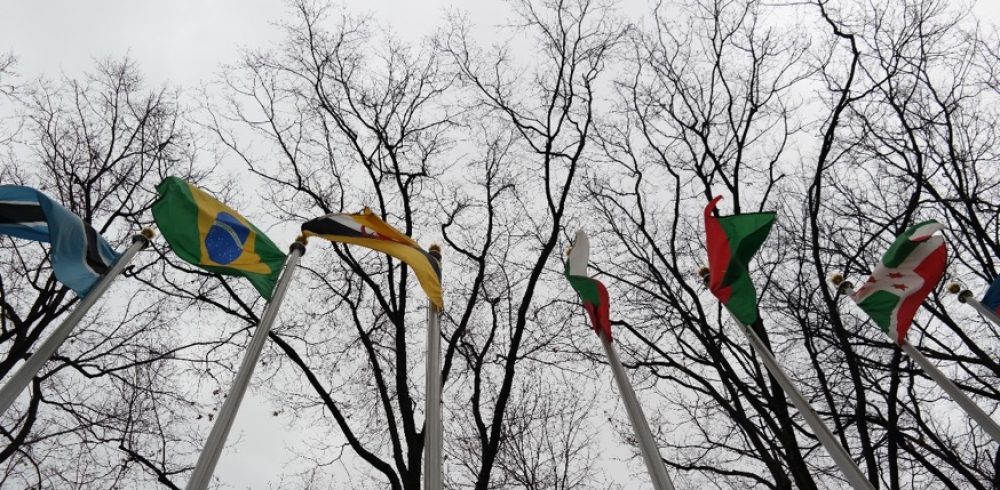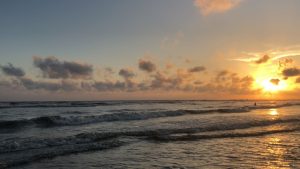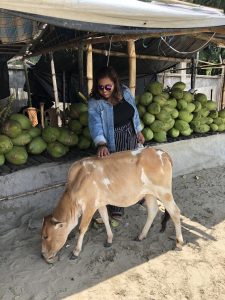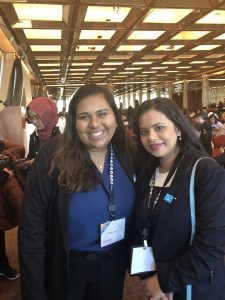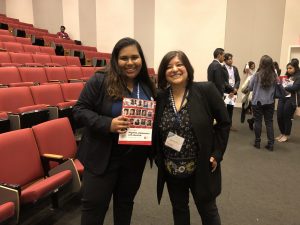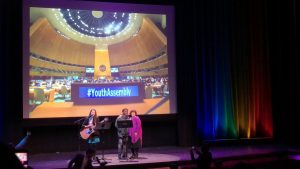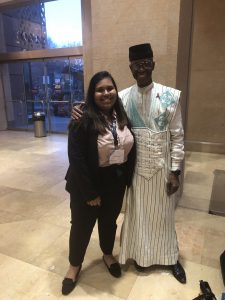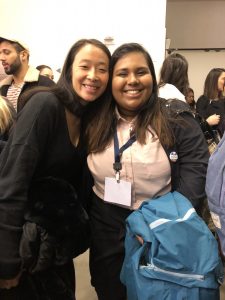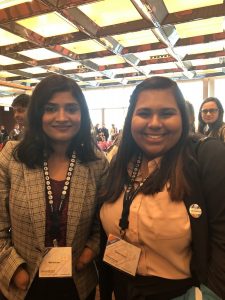Going to Bangladesh this past summer has been one of the best experiences of my life. I got an opportunity to learn more about my family and bond with them in a way that I’ve never been able to bond with before in my life. Currently, none of my relatives live in America, so I grew up never having met any of my relatives. I went to Bangladesh a couple of years ago, but I wasn’t able to enjoy it as much because there were so many people I haven’t met and I felt like I didn’t entirely fit in. This summer, my family got a chance to explore different cities and places such as Cox’s Bazar. I was able to have some incredibly fun experiences and have a summer worth remembering.
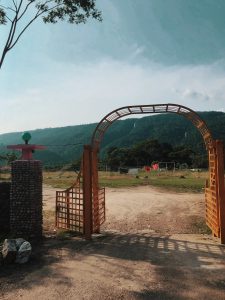
The Tamabil India-Bangladesh border. The mountains in the back are all India, and everything in front of them in the picture is Bangladesh.
One thing that constantly stood out to me was the difference between the culture of Bangladesh versus America. As someone who’s been raised in America, I haven’t really been exposed to many cultures. This is especially true since I do not travel internationally very often. It was shocking to learn about Bangladeshi values, such as their emphasis on tradition and family. I also learned about how there were many things that I took for granted, because my relatives were not able to experience as much as I have. For example, most of my relatives have never seen the ocean. We went to Cox’s Bazar, the longest sea beach in the world. When we first went to Cox’s the beach, many of my aunts were terrified of entering the water. This left me shocked, as I have been to beaches inside America numerous times. A trip to Coney Island was just a typical Sunday for me.
Seeing the differences between the lifestyles was also quite a shock for me. In Bangladesh, a typical evening consists of numerous relatives sitting inside a small room, telling each other random ghost stories or teasing each other. Since the culture was so family oriented, having fun meant even a simple day of hanging out with family. This was very different for me, because as I stated before, I grew up with no relatives, so a typical evening for me would consist of me on Netflix or studying for an exam.
Even the change in environment was a lot for me. Going from somewhat cool New York air to humid Bangladesh air with a real feel of 118°F was crazy. The use of ceiling fans and lack of air conditioning in most places made me extremely sweaty and sometimes even nauseous. Yet my relatives seemed completely fine, even during the multiple blackouts during the day that stopped the ceiling fans from running. Even going to different locations was a shock for me. My family usually took Ubers, unlike most people who took rickshaws everywhere. The Ubers came to be a symbol of wealth, although most Uber rides came out to under $2 (after being converted).
I remember I kept thinking about how I was used to so many luxuries that I was fortunate enough to have in America. I was used to air conditioning during summer weather. The closest beach for me is a 30-minute drive, compared to the 9-hour bus ride we had to take to Cox’s Bazar. Compared to Bangladesh, America seems to have more opportunities and resources available. Yet my relatives seemed extremely content and happy with life, even though some of them had so little. One of my cousins was happily thriving within a tin house the size of a garden shed. People in Bangladesh were satisfied with their lifestyle and what they had. They were satisfied with simpler things. In a way, this reminded me of a quote I read from a book:
In America everybody is somebody. They have so much and they all want more. In my country we are all nobodies; it’s easier. Here they are always trying to be somebody else. They go to the doctor and get a new nose, they get bigger chests- why aren’t they happy to have a nose that works and weather that is always good? (Homes, 30).
In this quote, the speaker is comparing his struggles from his homeland, India, to the concerns of people in America. This quote reminds me of my experiences from Bangladesh, because I feel like people in Bangladesh were satisfied with simpler things. To me, an American, this was a strange idea because I was used to the mentality of striving for more. It was odd to see people living in these poor conditions, but I learned that people with less were always happier with less. This also reminds me of the ideology from the popular rap song “Mo’ Money, Mo’ Problems,” by artists The Notorious B.I.G., P. Diddy, Kelly Price, and Mase. According to Genius, a website with lyrics and the meanings of songs, this rap song alludes to the idea that having more money causes more issues compared to having very little money, since your main concern is to just get by and survive (Genius).
Bringing this back to the CUNY Youth Ambassador experience, I remember thinking about how fortunate I was and how much I took things for granted. Back in January, I read the GEM reports and learned about students and their struggle with higher education. Realizing how lucky I was to be able to attend an honors college with completely free tuition made me think about how l lucky I was. I found that my role and my opportunities were something that I felt privileged to have. This feeling came to me when I attended the U.N. Winter Youth Assembly. I was surrounded by many powerful leaders throughout the world, and I even felt a sense of imposter syndrome. Eventually, I realized my duty to use this opportunity and my role to be a leader in my own community. In Bangladesh, learning about how people have been able to thrive and stay content with having so little (or what seems to be little compared to the American lifestyle), has caused me to try to have a different outlook on life. I may have more than some of the people in Bangladesh, but they are making the most of their lives and staying happy. Similarly, my role as the CUNY Youth Ambassador has made me become a privileged member of the CUNY community and has given me numerous experiences. I plan to use my newfound philosophy from Bangladesh as well as my genuine feelings of gratefulness for all that I experience to make my signature project something that can make a lasting impact on people. I want to use what I have been fortunate enough to have in my life in a way that can work towards global development and show people that they too can use their own resources to make a difference. Although I went to Bangladesh for only a couple of weeks, I feel that what I’ve learned and brought back home with me will hopefully last me a lifetime along with what I’ve learned as the CUNY Youth Ambassador.
Works Cited
M, Homes A. This Book Will Save Your Life. Granta Books, 2012.
“The Notorious B.I.G. (Ft. Diddy & Ma$e) – Mo’ Money Mo’ Problems.” Genius, 25 Mar. 1997, https://genius.com/The-notorious-big-mo-money-mo-problems-lyrics.
